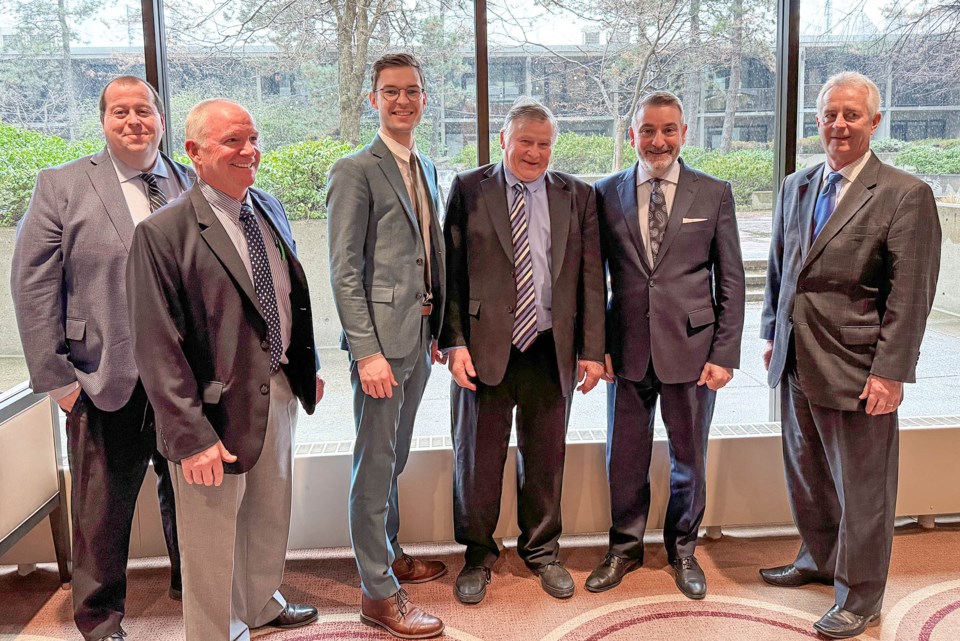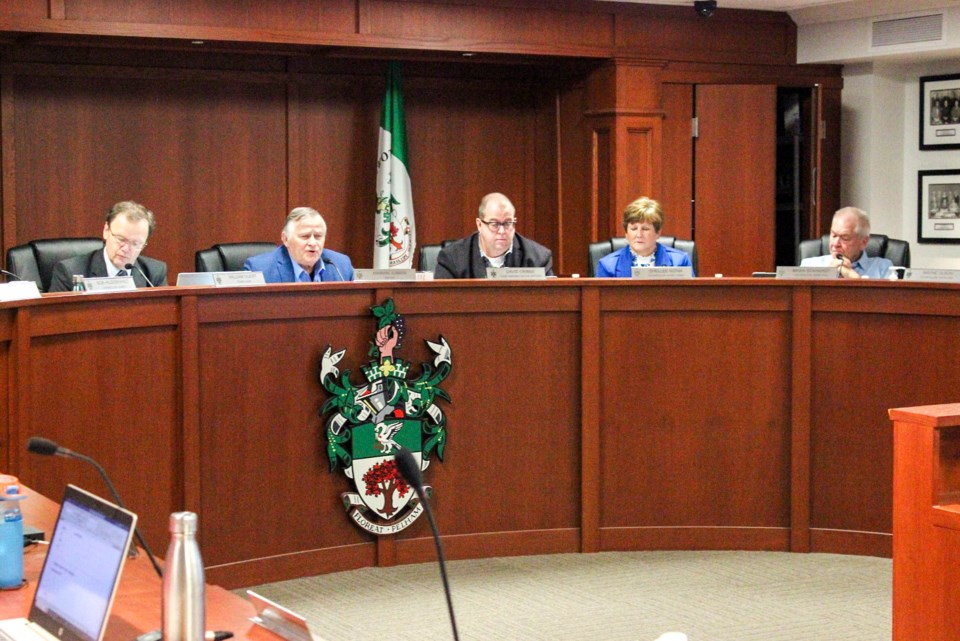The polarizing Pelham Town Council saga of dog-walking in cemeteries, 2024 edition, appeared to come to a close Wednesday, Jan. 24, with Mayor Marvin Junkin casting the tie-breaking vote to keep allowing canines in graveyards—subject to pending bylaw enforcement verbiage from staff.
Junkin was absent from the Jan. 10 meeting, which saw a 3-3 deadlock on the matter, with Deputy Mayor John Wink, Ward 1’s Wayne Olson, and Ward 2’s Brian Eckhardt voting against allowing dogs in cemeteries. Public reaction was swift and almost uniformly against such a ban, at least judging by letters to the editor of PelhamToday.
Junkin asked CAO David Cribbs to ensure that a “zero-tolerance” enforcement policy be implemented by the Town.
“Our bylaw staff do have the capacity to enforce the bylaw,” Cribbs said. He added however that new language would be needed to proclaim that dogs be kept on cemetery pathways and not on the grass near graves. The “prompt cleanup of waste” was already included.
“All bylaws and laws are made for that two-to-three percent of the population that don’t adhere to laws and bylaws,” Eckhardt, a former police officer, said. “It’s an issue about adequate enforcement.”
All bylaws and laws are made for that two-to-three percent of the population that don’t adhere to laws and bylaws
Wink asserted that dogs in local cemeteries have “increased exponentially since Covid” and said that whatever respect for gravesites existed in the past is now gone.
“The dog owners think it’s their right,” he said, which in fact is accurate, in the absence of a ban.
The Deputy Mayor, who explained to council at the last meeting that his late wife is buried in a local cemetery, also asserted that an old bylaw that barred dogs from cemeteries was never properly repealed.
“The existing bylaw has been there for years, decades,” he said. “The bylaw said ‘no dogs allowed’ in the cemetery. The signage was taken down over a decade ago.”
However, Wink did not mention that there is currently a sign at the pedestrian entrance of the Fonthill Cemetery at Daleview Drive and Moote Lane reminding people to pick up after their pets.
“We made a conscious choice to put our loved ones in that cemetery, and under the rules at that time we knew there were no dogs,” Wink asserted. “Had I known there was going to be a change, I may have changed my location of burial for my loved one.”
While Junkin said that numerous emails from residents on both sides of the issue were received over the last two weeks, only a single resident attended that portion of the council meeting, retired dentist Jim Jeffs, who spoke against dogs in cemeteries.
“We are reminded of the importance of respectful treatment of human remains, and we consider the controversy of buried children at Indigenous residential schools in Canada,” Jeffs said. “The fact that cemeteries exist at all demonstrates that we feel human remains should be treated with respect.”

Ward 1’s Kevin Ker pointed out that wildlife — including an oft-cited family of foxes near Fonthill Cemetery — could be responsible for at least some of the fecal matter found near graves, and stressed that dogs are important family members for many people.
“The restriction of a leashed pet to the pathways … I’ll be honest, I can support,” Ker said. “But a large number of people that are... buried there loved their pets as well.”
Either way, as Eckhardt alluded to, it appears the problems are the product of a small group of irresponsible pet owners.
“Once again (we are) in a position where we’ll be passing a bylaw or not passing a bylaw based on the behaviour of a few people who don’t respect these things,” Ward 1's Wayne Olson said.
Service dogs remain exempt from any bylaw, including barring them from grave plots. Cribbs said that the Town does not have the power to override provincial service dog laws.
Junkin tells Queens Park that Regional Council should shrink
Junkin said he met Tuesday in Toronto with Ontario Infrastructure Minister Kinga Surma and Niagara West MPP Sam Oosterhoff, and said he told Oosterhoff in no uncertain terms that the size of Niagara Regional Council should be reduced.
“I hinted to him quite strongly that in my discussion with people … mayors at the Regional Council, that perhaps one way to change the governance would be lowering the number of representatives that sit at the Regional Council,” Junkin said. “Right now we have 32 (members), we have 12 mayors and of course quite a few other representatives. Quite frankly, some nights it gets a little long.”

The discussions are all part of potential amalgamation the Niagara Region, something Junkin and all of the current Pelham council are dead set against.
The Mayor added he has been touting Pelham’s fiscal responsibility such as library cost-sharing with Lincoln, among other items.
He said that while the mayors of St. Catharines and Niagara Falls are more amenable to a four-city amalgamation model, all small-town mayors are against it.
“The vast, vast majority of municipalities said just ‘Listen, please just leave us alone, we’re willing to improve (our efficiency).’”
Junkin added that the exurban agricultural communities in the long-ago amalgamated cities of Hamilton and Ottawa “now have a hard time getting their voices heard with their urban neighbours.”
Studies have indicated that in almost all cases, amalgamated municipalities in Ontario have resulted in property tax increases, larger bureaucracy and long-term debt. Junkin said he expects to hear more about the matter in late summer.
With files by Sarah Ferguson.



